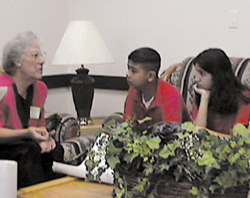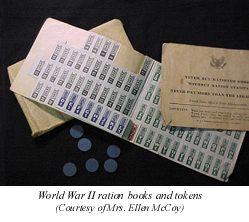|
“We
banded together and did the best we could, and we supported our men.”
|
|
 |
 |
|
Working
on the Home Front
|
|
|
-An
oral history of Rose Inglis
|
Home | Table of Contents | Previous Story | Next Story
Personal Profile | Audio Interview
|
When
the Japanese bombed Pearl Harbor on December 7, 1941, Rose Marie Maniscalco
was twenty years old. Although none of her immediate family was called into
service, Rose Marie felt the effects of war along with her neighbors in the
Heights. Helping them cope with the changes brought by the war was her contribution
to the war effort. “It seemed like everybody had a Throughout
the war, Rose Marie worked at a local Weingarten’s grocery store—one of thirteen
in the Houston chain. She recalls that Henke & Pilots—now Kroger—was Weingarten’s
biggest competitor, even though it had fewer Houston stores than Weingerten’s
at that time. As a grocery clerk, Rose Marie experienced rationing from a
unique point of view. She remembers helping her manager exchange ration stamps
for five-pound bags of sugar once a month. “[Customers] would swarm you like
. . . people at a big sale,” she says. Rose Marie also recollects the sacrifices people on the home front made during the war. Because gas was rationed, “you rode the bus to everything,” she says. “It made no difference where you were going. . . . [People] would say, ‘How’d you get here?’ and we’d say, ‘I came with Mac.’ In those days the buses were named Mac.” During the war years, riding the bus was relatively inexpensive—seven bus tokens cost just thirty-five cents. Mrs. Inglis says that people had little trouble making such sacrifices to support America’s troops. “We didn’t complain,” she remembers. “We just did without and went on.” Mrs. Inglis recalls going to the movies for both entertainment and to hear news from the war front. “We would go for fifteen cents to the shows . . . and that was one of our fun places,” she reminisces. But a trip to the movie theater also was a way to keep up with events transpiring overseas. “If you went to the movie, [newsreels] were shown . . . and that’s how we got most of the information.” Although newspapers and radio programs provided information as well, Mrs. Inglis says that newsreels contained the most up-to-date news from the war. Mrs. Inglis fondly remembers the end of World War II as the time when she met her husband, Charles. Technical Sergeant Charles Inglis returned from the service on December 21, 1945, to his family’s home next door to Rose’s. “His mother came over and said, ‘What do you think of my son?’” chuckles Rose. “I replied, ‘Oh, he’s very handsome.’ He asked me for a date, but I had [one] with a Marine, so I broke the date with the Marine and [Charles] became my husband two months later. . . . We’ve been married fifty-four years.” |
 brother,
a son, a husband that was in the service,” she remembers. “We prayed hard
and did everything we possibly could to make things go smoothly in [our] homes
and in [our] neighborhood, and we always worked together.” According to Rose
Marie, wartime was a time when neighbors relied on each other and did what
they could to support the soldiers. “We banded together, and we did the best
we could, and we supported our men.”
brother,
a son, a husband that was in the service,” she remembers. “We prayed hard
and did everything we possibly could to make things go smoothly in [our] homes
and in [our] neighborhood, and we always worked together.” According to Rose
Marie, wartime was a time when neighbors relied on each other and did what
they could to support the soldiers. “We banded together, and we did the best
we could, and we supported our men.”